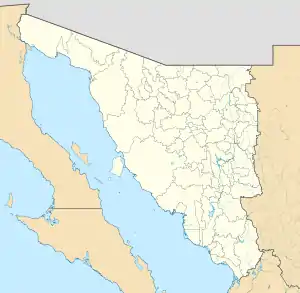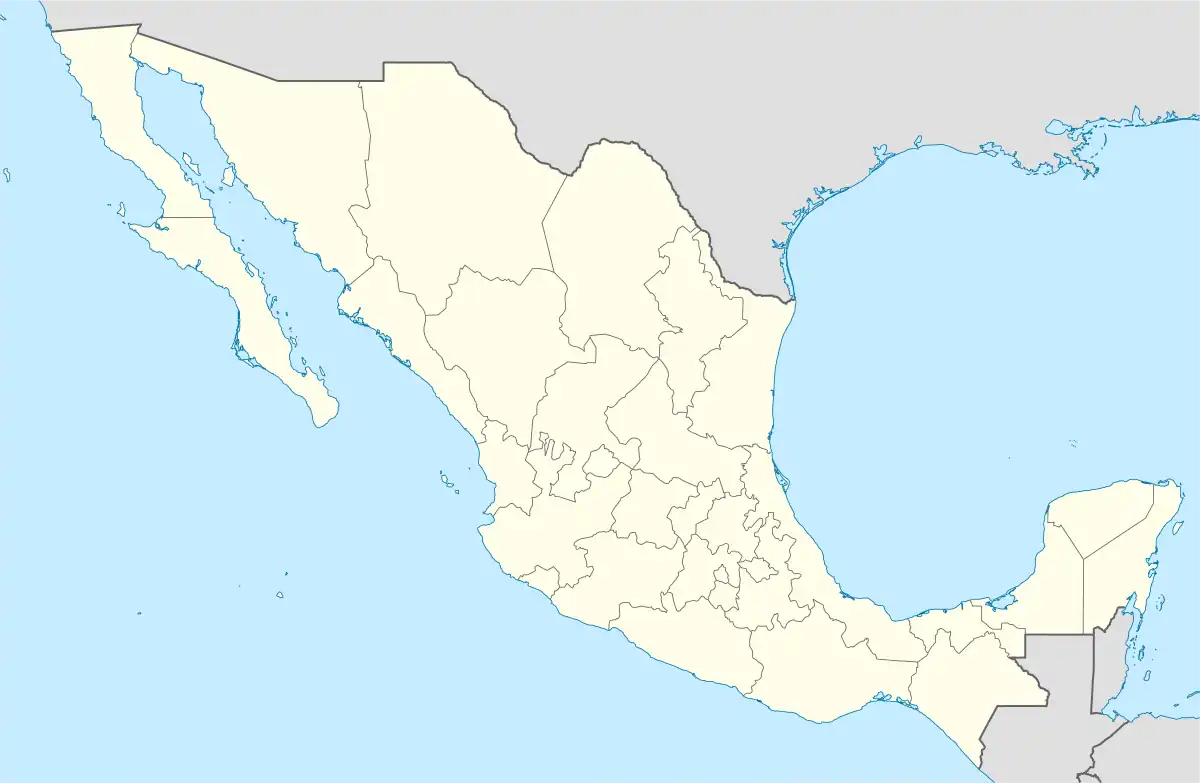Ures
Ures is a small city and a municipality in the Mexican state of Sonora.
Ures | |
|---|---|
 Ures  Ures | |
| Coordinates: 29°25′N 110°23′W | |
| Country | Mexico |
| State | Sonora |
| Municipality | Ures |
| Time zone | UTC-7 (Pacific (US Mountain)) |
| • Summer (DST) | UTC-7 (No DST) |
Population
In the year 2000, the total population was 9,553 residents. New figures from 2005 reported 8,420, meaning a considerable decline in population due to emigration. The municipal seat had a population of 3,959 in 2000.
Geography
It has an area of 2,618.56 square kilometers. This is 1.41% of the total area of the state, and 0.13 percent of the national area of Mexico. Besides the seat, the most important localities are Guadalupe de Ures, San Pedro, Pueblo de Alamos and El Sauz.
The municipality is in the basin of the Sonora River. As the river crosses the area, the river receives waters from Los Alamos, Bamuco, Nava, San Pedro, Cañada de Agua, and Los Cochis. Also, it receives runoff from washes as El Carrizo, Zuribate, Palo Parado, La Ladrillera, Santiago, and El Pescado. It has a reservoir that was recently built called Teópari.
The municipality is nestled within the mountains, hills, and valleys that form the edge of the Western Sierra Madre. The elevation of the administrative seat was 420 meters above sea level.
Climate
The average maximum monthly temperature is 31.8 °C (89.2 °F) in the month of July, the average minimum monthly temperature is 15.2 °C (59.4 °F) in the month of January, and the overall average temperature is 23.1 °C (73.6 °F). The annual precipitation is 430.1 millimetres (16.93 in), and the rainiest months are July and August. There are occasional frosts from December to March.
Vegetation
The vegetation is of mesquite and subtropical desert species.
Communications
A paved federal highway crosses the municipality from west to east.
History
Ures is one of the oldest cities of the state of Sonora. It was first reported by Cabeza de Vaca on his overland trek from Galveston in the 1530s and was called by him "Corazones", or "Village of Hearts". Coronado stopped there in the course of his 1540 expedition.[1] It was founded in 1644 as a mission by the Jesuit missionary Francisco París,[2][3] and was known as San Miguel de Ures until 1665. In 1823 Ures became the capital of Sonora, but was replaced the following year when Sonora was merged into Occidente State.
At the end of 1838, Ures became a city; and was the capital of Sonora from 1838 to 1842, and again from 1847 to 1879. Afterwards, it became the seat of a district.
During the Fall of the Second Mexican Empire in 1866, the Battle of Guadalupe took place within the municipality of Ures. On September 5, 1998, the state legislature gave it the title of Heroic City, commemorating the liberal defense against imperialists. . Geronimo took refuge in the mountains of this region when generals Crook and Miles fought him in Arizona. The most notable Apache raids were in 1870, when the priest Echevería was killed in the town, and in 1882, when the distinguished scholar Leocadio Salcedo was killed at the La Noria ranch. Residents of the region also had problems with Yaqui uprisings and insurrections of the late 19th and early 20th centuries.
Tourism
In Ures you can visit “La Plaza de Armas(La Plaza de Zaragoza)” with its four 18th-century bronze sculptures, San Miguel Mission and the church bearing the same name with its legendary mesquite stairway. In addition, you will see the majestic arch commemorating the Independence and the house where General Pesqueira used to live, The Folkloric Museum, and the old Flour Mill.
Government
Municipal presidents
| Municipal president | Term | Political party | Notes |
| Adeodato Campbell Quijada | 1868 | ||
| Fernando M. Araiza[4] | 1913–1914 | ||
| Ernesto Estrella | 1914–1915 | ||
| Victoriano Navarro | 1915 | ||
| Alfredo Romo | 1916 | ||
| F. J. Morales | 1917 | ||
| Constantino Laborín | 1920–1922 | ||
| Jesús Casillas | 1922–1923 | ||
| Santiago Muñoz | 1923–1929 | ||
| Luis S. Navarro | 1929–1931 | PNR |
|
| Victoriano Navarro | 1931 | PNR |
Acting municipal president |
| Luis Haro | 1931–1932 | PNR |
|
| Jesús Núñez D. | 1932–1933 | PNR |
|
| Rafael Puebla | 1933 | PNR |
Acting municipal president |
| Miguel Canizales Bonilla | 1933–1935 | PNR |
|
| Manuel J. Duarte | 1935 | PNR |
Acting municipal president |
| Pedro López P. | 1935–1937 | PNR |
|
| Antonio Arce | 1937 | PNR |
Acting municipal president |
| Rafael Puebla | 1937–1940 | PNR PRM |
|
| Anselmo Gándara | 1940–1943 | PRM |
|
| Reynaldo Paz Molinares | 1943–1946 | PRM |
|
| Jesús Noriega Calles | 1946–1949 | PRI |
|
| Alfredo Romo Córdova | 1949–1952 | PRI |
|
| Rubén Romo Córdova | 1952–1955 | PRI |
|
| Francisco Amador Torres | 1955–1958 | PRI |
|
| Antonio Gándara Romo | 1958–1961 | PRI |
|
| Héctor Maytorena Salcido | 1961–1964 | PRI |
|
| Moisés Navarro Duarte | 1964–1967 | PRI |
|
| Francisco Téllez Villaescusa | 1967–1970 | PRI |
|
| Abel Estrella Bustamante | 1970–1973 | PRI |
|
| Héctor Romo Córdova | 1973–1976 | PRI |
|
| Guadalupe Trujillo Romo | 1976–1979 | PRI |
|
| Óscar Jara Ramírez | 1979–1982 | PRI |
|
| Eduardo A. de los Reyes Gray | 1982–1985 | PRI |
|
| Marco Antonio Romo Aguilar | 1985–1988 | PRI |
|
| Eduardo Salcido Celaya | 1988–1991 | PRI |
|
| Jorge Alberto Gastélum[5] | 1991–1994 | PRI |
|
| Ramón Mario López Córdova[6] | 1994–1997 | PRI |
|
| Manuel Ignacio Espinoza González[7] | 1997–2000 | PRD |
|
| Arnoldo Trujillo Fuentes[8] | 2000–2003 | PRI |
|
| Marco Antonio Coronado Acuña[9][10] | 16-09-2003–15-09-2006 | PRI |
|
| Juan Ángel Córdova Salcido[11][12] | 16-09-2006–15-09-2009 | PRI Panal |
Alliance PRI Sonora-Panal |
| Noé Coronado Cha[13] | 16-09-2009–15-09-2012 | PAN |
|
| José Manuel Valenzuela Salcido[14] | 16-09-2012–15-09-2015 | PAN |
|
| David Gracia Paz[15] | 16-09-2015–15-09-2018 | PRI PVEM Panal |
Coalition "For an Honest and Effective Government" |
| Héctor Gastón Rodríguez Galindo[16] | 16-09-2018–15-09-2021 | PAN |
Coalition "For Sonora to the Front" |
| José Manuel Valenzuela Salcido[17] | 16-09-2021– | Morena |
References
- Baskett, James Newton (April 1907). "A Study of the Route of Cabeza de Vaca". Texas Historical Association Quarterly. 10: 308–340. Retrieved Sep 10, 2019.
- Polzer, Charles W. (ed); Naylor, Thomas H. (ed.); Sheriden, Thomas E. (ed.); Hadley, Diana (ed.) (1991). The Jesuit Missions of Northern Mexico. Garland Publishing, inc. ISBN 0-8240-2096-0. Retrieved Sep 20, 2019.
{{cite book}}:|first1=has generic name (help) - Polzer, Charles W. (1972). "The Franciscan Entrada into Sonora 1645-1652: A Jesuit Chronicle". Arizona and the West. 14 (3): 253–278. JSTOR 40168155.
- "Enciclopedia de los Municipios y Delegaciones de México. Sonora. Ures" (in Spanish). Retrieved 11 September 2021.
- "Municipios gobernados por partido político. Período constitucional 1991-1994" (PDF) (in Spanish). Retrieved 11 September 2021.
- "Municipios gobernados por partido político. Período constitucional 1994-1997" (PDF) (in Spanish). Retrieved 11 September 2021.
- "Municipios gobernados por partido político. Período constitucional 1997-2000" (PDF) (in Spanish). Retrieved 11 September 2021.
- "Consejo Electoral del Estado de Sonora. Conformación de Ayuntamientos. 2000" (PDF) (in Spanish). Retrieved 11 September 2021.
- "Resultados oficiales de la elección de Ayuntamientos. 2003" (PDF) (in Spanish). Retrieved 11 September 2021.
- "Municipios gobernados por partido político. Período constitucional 2003-2006" (PDF) (in Spanish). Retrieved 11 September 2021.
- "Consejo Electoral del Estado de Sonora. Conformación de Ayuntamientos. 2006" (PDF) (in Spanish). Retrieved 11 September 2021.
- "Municipios gobernados por partido políticos. Período constitucional 2006-2009" (PDF) (in Spanish). Retrieved 11 September 2021.
- "Consejo Electoral del Estado de Sonora. Conformación de Ayuntamientos. 2009" (PDF) (in Spanish). Retrieved 11 September 2021.
- "Consejo Electoral del Estado de Sonora. Conformación de planillas de Ayuntamiento. 2012" (PDF) (in Spanish). Retrieved 11 September 2021.
- "Instituto Electoral y de Participación Ciudadana de Sonora. Conformacion de planillas de Ayuntamiento. 2015" (PDF) (in Spanish). Retrieved 11 September 2021.
- "Instituto Electoral y de Participación Ciudadana de Sonora. Cómputo municipal. Período constitucional 2018-2021" (PDF) (in Spanish). Retrieved 11 September 2021.
- "Instituto Estatal Electoral y de Participación Ciudadana de Sonora (IEESonora). Autoridades electas. Presidencia Municipal de Ures" (in Spanish). Retrieved 11 September 2021.
Sources consulted
- Enciclopedia de los Municipios de Mexico
- INEGI National statistics
External links
- Ures, Ayuntamiento Digital (Official Website of Ures, Sonora)
